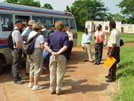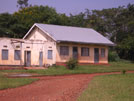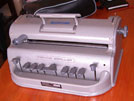

by Judy Gallegos
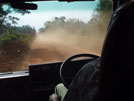 We began our day at the Hotel Africana in the capital city of Kampala, Uganda. Our first stop was the School for the Blind 38 kilometers outside of Kampala. That is less than 25 miles. It took us 1 1/2 hours to make the trip in the bus that the local Rotarians arranged for us. The last part of the trip was on a dusty dirt road. The dirt is very red, but Kate dubbed it "clean dust".
We began our day at the Hotel Africana in the capital city of Kampala, Uganda. Our first stop was the School for the Blind 38 kilometers outside of Kampala. That is less than 25 miles. It took us 1 1/2 hours to make the trip in the bus that the local Rotarians arranged for us. The last part of the trip was on a dusty dirt road. The dirt is very red, but Kate dubbed it "clean dust".
School For the Blind
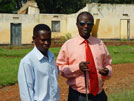 We toured the school grounds with the Headmasters and Directors Kinubi Francis and Mabonga joshua Makai. Mabonga was sighted, but Kinubi was blinded at age 4 because of Measles. Some main causes of blindness in children in Uganda are Measles, Trachoma (a disease caused by fly bites), and lack of Vitamin A in their diet. Many of the Rotarians we have met here have spoken about their desire to eradicate Measles from Uganda.
We toured the school grounds with the Headmasters and Directors Kinubi Francis and Mabonga joshua Makai. Mabonga was sighted, but Kinubi was blinded at age 4 because of Measles. Some main causes of blindness in children in Uganda are Measles, Trachoma (a disease caused by fly bites), and lack of Vitamin A in their diet. Many of the Rotarians we have met here have spoken about their desire to eradicate Measles from Uganda.
The property was originally used during the 1950's to the 1980's to teach blind adults some living skills. That program was abandoned in the 1990's, but the property was still owned by Sight Services. The school started in 1999 with the existing buildings in disrepair and Kinubi said that the brush had grown up as a jungle tall as he is. All of that had to be cleared. Newly constructed classrooms were completed May 25, 2006. The old classrooms will be re-roofed and hopefully turned in to a sick bay. When a child is sick now, they have to take them to town and pay some high fees.
As a child Kinubi had been fortunate to attend a special school for the blind and had advanced his education to the level of being a certified teacher. He understands exactly the challenges of his students. The school has 62 students, 26 girls and 36 boys aged 5-16. They have grades 1-7. The staff is 3 men and 3 women. Since it is a boarding school, that staff includes meal preparation, laundry, etc. The school sits on 40 acres. They have a garden to grow food for the children. They are planning to start a farm on part of the land to raise chickens, goats, and cows. This would provide food for the school as well as a surplus that they can sell to help support the school.
The tuition is about $55 per trimester. Most children cannot pay it. Some are sponsored by Catholic Charities from the U. S. Some parents make partial payments. They ended the last school year with a Two Million shillings deficit (about $1,100). Most of that is owed to shopkeepers in the neighboring town. The shopkeepers are very supportive and patient, but really do need the amounts to be paid.
This school would like to purchase 10 Braille writing machines, some white canes, and some bunk beds. Our district is doing a large matching grant that will cover these items.
Kinubi is a very intelligent, hard working, compassionate man who has been placed in the spot on earth to truly make a difference in the lives of these children who might not survive at all without him. They not only survive there, they can thrive, grow, learn and become productive in society as he has done. Very inspiring.
On our way back from Kampala, the members of our team indulged me while the local Rotary Club President (and former Postmaster General) took me to a post office to buy some stamps. Then we rested and had lunch at the Ridar Hotel. A children's choir came by to film a commercial for a local television station and we were treated to their performance.
Kampala School for the Physically Handicapped
In the afternoon we visited the Kampala School for the Physically Handicapped. This school is also a boarding school. They have 98 students and would like to expand to 120. It is just about 50/50 boys and girls. 60 % of the students have cerebral palsy.
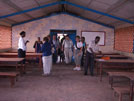 Joy Mwesigwa, the Director of the school showed us the Occupational training room where the students are learning sewing, leather work, pottery, screen printing, and many crafts. Those crafts are sold along the road (and of course we were big customers) to help support the school. It is a challenge in Uganda for an ordinary person to get employment let alone the handicapped. They need additional sewing machines, perhaps three manual and 1 electric. Electricity is not reliable, but also they like to start them off on a manual so that they have that skill. Outside the school they may get employment where there is not electricity.
Joy Mwesigwa, the Director of the school showed us the Occupational training room where the students are learning sewing, leather work, pottery, screen printing, and many crafts. Those crafts are sold along the road (and of course we were big customers) to help support the school. It is a challenge in Uganda for an ordinary person to get employment let alone the handicapped. They need additional sewing machines, perhaps three manual and 1 electric. Electricity is not reliable, but also they like to start them off on a manual so that they have that skill. Outside the school they may get employment where there is not electricity.
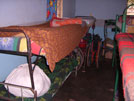 We saw the Physical Therapy room and the equipment they have there. The dorm rooms all have bunk beds. We talked about how difficult it was for a child in a wheel chair to get into a top bunk. They would like to have room to change it to all single beds. In the dining room they need tables specially made to accommodate the wheelchairs and some tables that are very low for those that must sit on the floor on mats.
We saw the Physical Therapy room and the equipment they have there. The dorm rooms all have bunk beds. We talked about how difficult it was for a child in a wheel chair to get into a top bunk. They would like to have room to change it to all single beds. In the dining room they need tables specially made to accommodate the wheelchairs and some tables that are very low for those that must sit on the floor on mats.
The highlights of the tour were the craft room and a special track they have for wheelchair racing They are very interested in supporting some physical activities.
Our District with provide some of the mentioned equipment to the school as part of the large matching grant mentioned above.
These two schools are especially important to Sylvia Nagginda, the Nnabagereka (Queen) of Buganda, the biggest of 10 kingdoms in Uganda. She has taken a special interest in the handicapped children of Uganda. She is a role model for change and acceptance of the handicapped.
Home |
Calendar |
Directory |
Club Information |
Club News |
Yellow Pages |
Speakers Bureau |
Registration |
Quickbits
Newsletter |
Public Relations |
Membership Resources |
Club Service |
Community Service |
Vocational Service
New Generations |
International Service |
Rotary Foundation |
Peace |
Training |
Awards |
Rotary Links |
Archives

